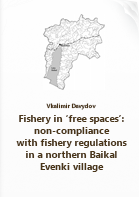Fishery in ‘free spaces’: non-compliance with fishery regulations in a northern Baikal Evenki village
During the post-Soviet period, fishery became one of the main sources of income for the inhabitants of Evenki villages in the northern Baikal region. When a number of villagers lost their official jobs, they managed to earn money by selling fish. Most people are required to fish during a particular season and to follow official quotas. Special indigenous Evenki quotas, however, are usually in excess of regular official guidelines and those who can use these quotas usually exceed them. This results in a tension between the way local Evenki people judge their own actions and the way their actions are judged by the official authorities. The law never covers all the areas of human activities, and in these gaps regular people manage to control certain institutions, knowledge and the use of landscapes themselves. In a discussion of the northern Baikal area, I employ the term ‘free spaces’, that describes the weakening of external control over the sphere of activities which are essential for local people’s survival. This lessening of control has led people to regulate the fishing situation locally, resulting in many violations of fishing laws not being registered in official documents. The purpose of this paper is to to discuss a case of ‘free spaces’ in the post-Soviet Evenki village, with particular focus upon the village’s non-compliance with official fishery regulations. This article investigates the reasons for, and the social mechanisms guiding, non-compliant behaviour in a northern Baikal Evenki village. It argues that non-compliance with fishery regulations should be interpreted within the context of local mechanisms of social control, market relations, reciprocity and cooperation.

